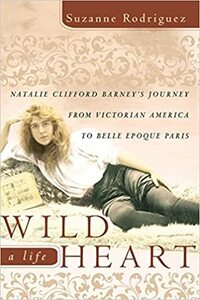Take a photo of a barcode or cover
adventurous
challenging
dark
emotional
hopeful
informative
reflective
sad
medium-paced
informative
reflective
adventurous
informative
medium-paced
Really enjoyed sinking into this biography. I particularly appreciated how it tackled the uncomfortable parts of Natalie's life head on, such as the contradictory nature of her antisemitism and attitudes during the Second World War, something which I found lacking when I read No Modernism Without Lesbians by Diana Souhami.
At first the book starts slow, demonstrating the childhood of Natalie Clifford Barney. However, the book accelerates and becomes more exciting as she comes of age. By the end, I was utterly enamored with Miss Barney.
Rodriguez’s writing comes off as a love letter to this famous Amazon of Literary Paris, and because of it I was enraptured right from the beginning. NCB led an interesting, wild, and (mostly) happy life, and I am sad that this is the first time I’m ever learning of this woman. What I loved most was that it’s clear her true legacy lies in the way she was steadfastly sure of herself and who she loved, and how she treated and supported others up until her last day. This was a fantastic biography, and I’ll be sad to part with it.
interesting enough subject matter, not so interestingly written.
emotional
informative
medium-paced
Excellent book about a woman I've never really heard of. Which is shocking with how amazing a life she lead!
Graphic: Infidelity
A very interesting account about a very interesting lady.
Natalie Clifford Barney, born in Dayton, Ohio in 1876 in a wealthy family was, from the start, a free spirit. She lived her life defying society's conventions. She lived openly, never hiding or giving excuses for being a lesbian or feminist or for her dreams as a writer. She refused to marry and instead moved to Paris in the early 1900s where she would live for the rest of her life.
I can't recall where I first came across Barney's name, but the more I read about her, the more fascinated I became. I was thrilled that there was a full length bio out there. This seemed to be a very good one, thankfully, seeing as how it seems to be the only one.
It was definitely a tome, which was fine by me. Rodriguez hit on just about everything. Everything from the smallest detail to mentioning a person Barney only met once or twice. We were given long accounts of the women who played important roles in her life such as Pauline Tarn, Liane de Pougy and Romaine Brookes. Deriving from personal papers and the memories of people who knew Natalie, Rodriguez paints a very vivid portrait of the woman most knew as 'The Amazon.'
Rodriguez also did not make excuses for Barney's faults. And she did have them. A few things I had a problem with was that Barney was a feminist, but a few times gave off a few misogynist quotes, which I found surprising, seeing as how she was a woman who loved women and was in the forefront of advancing women's talents. Another was her anti-semitic views. Which, as Rodriguez states, seems to come out of no where. Barney was herself 1/8 Jewish and had at times seemed to be proud of her Jewish ancestry, but somewhere around WWII she gave off some very nasty comments. No one seems to know what sparked Barney to say such things.
Barney was a patron of the arts, and didn't know much about politics and such. When Erza Pound went off on his rants before WWII, Barney sat next to him and agreed with him. She was the only one. Everyone else just thought he was nuts and he ended up going away for treason. I found it interesting how she just accepted whatever he said because it sounded good.
Back to the good stuff, Barney played a huge part in advancing the careers of both men and women writers and painters, especially those she was close with: lovers and close friends. At her famous salon (which lasted about 60 years), referred to simply as 'Fridays' she sometimes dedicated a Friday to one person's work. What I wouldn't give to go back and time to witness these 'Fridays' firsthand. The most famous names in the arts would visit Barney's salon and would discuss art, literature and so on. Plays would be put on, buffets would be set out, ideas would be exchanged.
I could go on, but this book covered so much. When I finished Wild Heart I came away with a deep appreciation for a woman who was definitely a rebel.
Wild Heart is a deep, fantastic book about a glittering world of time gone by.
Natalie Clifford Barney, born in Dayton, Ohio in 1876 in a wealthy family was, from the start, a free spirit. She lived her life defying society's conventions. She lived openly, never hiding or giving excuses for being a lesbian or feminist or for her dreams as a writer. She refused to marry and instead moved to Paris in the early 1900s where she would live for the rest of her life.
I can't recall where I first came across Barney's name, but the more I read about her, the more fascinated I became. I was thrilled that there was a full length bio out there. This seemed to be a very good one, thankfully, seeing as how it seems to be the only one.
It was definitely a tome, which was fine by me. Rodriguez hit on just about everything. Everything from the smallest detail to mentioning a person Barney only met once or twice. We were given long accounts of the women who played important roles in her life such as Pauline Tarn, Liane de Pougy and Romaine Brookes. Deriving from personal papers and the memories of people who knew Natalie, Rodriguez paints a very vivid portrait of the woman most knew as 'The Amazon.'
Rodriguez also did not make excuses for Barney's faults. And she did have them. A few things I had a problem with was that Barney was a feminist, but a few times gave off a few misogynist quotes, which I found surprising, seeing as how she was a woman who loved women and was in the forefront of advancing women's talents. Another was her anti-semitic views. Which, as Rodriguez states, seems to come out of no where. Barney was herself 1/8 Jewish and had at times seemed to be proud of her Jewish ancestry, but somewhere around WWII she gave off some very nasty comments. No one seems to know what sparked Barney to say such things.
Barney was a patron of the arts, and didn't know much about politics and such. When Erza Pound went off on his rants before WWII, Barney sat next to him and agreed with him. She was the only one. Everyone else just thought he was nuts and he ended up going away for treason. I found it interesting how she just accepted whatever he said because it sounded good.
Back to the good stuff, Barney played a huge part in advancing the careers of both men and women writers and painters, especially those she was close with: lovers and close friends. At her famous salon (which lasted about 60 years), referred to simply as 'Fridays' she sometimes dedicated a Friday to one person's work. What I wouldn't give to go back and time to witness these 'Fridays' firsthand. The most famous names in the arts would visit Barney's salon and would discuss art, literature and so on. Plays would be put on, buffets would be set out, ideas would be exchanged.
I could go on, but this book covered so much. When I finished Wild Heart I came away with a deep appreciation for a woman who was definitely a rebel.
Wild Heart is a deep, fantastic book about a glittering world of time gone by.
NOW WE'RE TALKING. Natalie Barney is a goddamn delight* and this book, once it passed through her early days and got to the juicy stuff, was a name-dropped revery of early 20th century literature, culture, gayness, whatever. I intentionally paired this book with The Well of Loneliness and glory hallelujah am I glad I read this second. Let's just have a glass of lemonade and relax.
*Rodriguez does, I think, an excellent job reckoning with her subject's antisemitism, which is a tall order when you're writing such a rhapsodic and contextually-conscious book. Still, she doesn't make excuses, and she doesn't shy away from some real ugliness.
*Rodriguez does, I think, an excellent job reckoning with her subject's antisemitism, which is a tall order when you're writing such a rhapsodic and contextually-conscious book. Still, she doesn't make excuses, and she doesn't shy away from some real ugliness.







